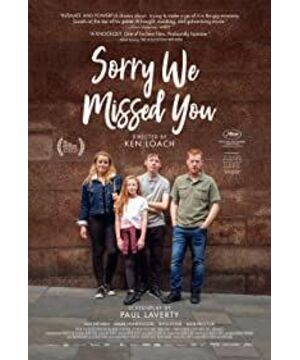He was wearing a plain black jacket with a plain blue shirt, looking as ordinary as any of his characters. He looks concerned, and that concern never seems to leave him, as if it's carved into his features. He speaks in a thin, gentle voice, not in the least radical as his political views. He reminds you of the amiable old man living in your neighbourhood who greets you every time he sees you. Or maybe he is one.
I've always felt somewhat ambivalent about Ken Loach. I disagree with him fundamentally on the subject of socialism, but I appreciate his films, and admire his lifelong dedication to representing the working class and making their struggles known. Indeed I liked his films every time I saw them, this one as well, and this is mostly because they are true to life. As much as people like to criticise his films as being'ideologically purposeful', the struggles he depicts are real – they are people's lives, they are what they have to face every day, and they are notfiction. And he has managed to show them in a way that touches people's hearts deeply. What is a shame, and perhaps will remain as shame, is that the group he strives to represent in his films will never go to see a film such as his; his films, though dedicated to'low brows', are categorically'high brow'. It is an undeniable fact that those who do go to see his films are almost always from a higher class with a rarefied taste and never need to live through the kind of hardship as shown in the films. That is to say, for his target audience, his films to some extent serve to provide a shocking value, and this will induce sympathy instead of recognition, which will further increase the gap between classes rather than closing it.
As an expat I consider myself independent from all the class categories ingrained in this country's culture and history. Perhaps this is why I could watch Ken Loach's films and be touched, without being manipulated into feeling guilty of being what you are, the same guilt that has driven, not only the middle class of this country but the entire western world into leftist politics. Undeniably Ken Loach's films are emotionally powerful, and in his latest two films in particular ( I, Daniel Blake and Sorry We Missed You), this powerfulness has become ever more obviously the result of manipulations. If you watched them you'd know, every sequence is constructed in a way that provokes certain emotions, mostly sympathy and anger. But even though I knew I was being manipulated, I didn't seem to want to resist it, because I know for a fact what I see on the screen is what happens in real life. They are like pieces of people's lives being condensed into one episode of one person's life to maximise the effect , and to force you into a painful realisation of the existing social problems that surround you.
The evening I watched Sorry We Missed You , I was actually in tears towards the ending. And I noticed that the old lady sitting next to me was sobbing for a long time even after the film ended. But the evening soured for me later because of the post-screening session, which I was actually looking forward to at the beginning.
(From here onwards I'm going to be ranting. Although I doubt anyone would have the patience to read this far, I'm still giving out this warning: if you identify yourself as a left-winger, please stop reading. I don 't want to offend you and I don't want any arguments. I'm well aware that your opinions won't be changed by some random person's ranting.)
It started with a woman, who, on her way to the loo, shouted to everybody in the room:'if you are touched by this film, vote for Labour!' while the credits were still rolling. This ostentatious crying for attention instantly destroyed the sorrow I was wallowing in. Back then I (naively) thought it was just the one person. Soon after that, the first question from the audience arose, asked by a Labour Party member who claimed that she was'abused' by the working class in the north of Nottingham while she was knocking on their door trying to get them to vote for Labour. She asked Ken Loach why are they so'difficult', and why do they not trust Labour. To which he responded:'Forget about the election. Think about the real problems each of these individuals might be facing.Is there a family starving? An old person not getting any care? Help them as you can. These are the real things that matter.' Adding to that, he also mentioned how the trust was broken as the Labour Party changed over time. He finished answering the woman's question by saying that the Labour Party is '180 percent different from what it was in the past'. Of course he said this in his unchanging gentle voice, but the sentiment of disappointment in the party was not concealed altogether. But later I learned that the reason he was disappointed in the Labour Party nowadays is because it's not left enough, and he is in fact a keen supporter of Jeremy Corbyn.He finished answering the woman's question by saying that the Labour Party is '180 percent different from what it was in the past'. Of course he said this in his unchanging gentle voice, but the sentiment of disappointment in the party was not concealed altogether. But later I learned that the reason he was disappointed in the Labour Party nowadays is because it's not left enough, and he is in fact a keen supporter of Jeremy Corbyn.He finished answering the woman's question by saying that the Labour Party is '180 percent different from what it was in the past'. Of course he said this in his unchanging gentle voice, but the sentiment of disappointment in the party was not concealed altogether. But later I learned that the reason he was disappointed in the Labour Party nowadays is because it's not left enough, and he is in fact a keen supporter of Jeremy Corbyn.
In no time the shock came as Labour's shadow chancellor of the exchequer, John McDonnell showed up. He was invited to the stage to answer questions along with Ken Loach. From there, as you can imagine, the whole post-screening Q&A just turned into an unshrinking presentation of lobbying to get people to vote for Labour. If you've watched a British TV recently you'd know what's it like. Great promises flying around, as if as soon as Labour won power all the problems would just go away instantaneously. And what is their practical approach to that end? Summarising John McDonnell's speech, it is to spend, spend, and spend (I guess he is the finance chancellor after all). To use his own words, they will'invest in the NHS' (£129.3 billion apparently), they will'scrap the tuition fee', they will increase the national minimum wage,and they will cut down prices... These talks make me wonder how exactly does the Labour government plan to make money? Where does all this money come from? It isn't easy to achieve even just one of these goals, to say the least, yet McDonnell talks as if he could do it effortlessly once'shadow' became lost from his title. You are going to improve the wage level while cutting down the price at the same time? I say you are dreaming. Or you are deceiving.You are going to improve the wage level while cutting down the price at the same time? I say you are dreaming. Or you are deceiving.You are going to improve the wage level while cutting down the price at the same time? I say you are dreaming. Or you are deceiving.With Labour it's all prospects and no efforts. Their government gives and never takes. I find it extremely hard to believe any of these promises coming out of his mouth, but every time he said one, with a thrilling fist gesture, applauds arose from the audience. Frankly, to this day I still continue to be surprised by how simplistic the left-wing middle-class minds are. Have you lot just forgotten how the Lib Dem, after campaigning for years to abolish the tuition fees altogether, tripled them as soon as they got people's support and came to power? Are you all just going to believe whatever the Labour Party is telling you now because it sounds wonderful? If that's the case, I can only say,'the road to hell is paved with good intentions'.
Speaking of simplistic mind and poisonous good intentions, another woman from the audience, who actually addressed the film a little bit in her question, said that we all hold personal accountability for the hardship that delivery drivers like the character in the film have to go through , because we are creating a demand by shopping online and wanting things delivered. While she was talking, again, I heard some applauds in agreement. I understand that they are bringing the responsibility to themselves because they care and want to help (or do they ?); however, to think that a job shouldn't exist just because it is hard for the person who does it, to me is just the most simplistic and facile thinking ever. Why not think a little bit further,and ask what is actually making the job hard? Is it really the increasing demand for the job that makes it hard? Is killing the demand and subsequently making the job disappear really the solution to it? No. If anything, the film makes it clear that the job is lucrative because of the large demand for delivery, which is why the protagonist really wants to do it ('I've been waiting for an opportunity like this for ages'). From what the film tells us, it is clear to me that the problem is that the entire gig economy has become robotic and are implementing unreasonable, inhuman rules to punish the workers for nothing. A delivery driver can be perfectly happy doing a delivery job if his basic rights such as holidays, pension and insurance are fulfilled and protected.The current system is so rubbish and there is no excuse for it because the exploitation of workers is not bringing any benefits to the customers either. Through watching this film, I came to understand why in the UK 90% of the online shopping doesn't get delivered from the first attempt – because whoever is in charge is putting too much stress on delivering the goods'on time' (in most cases customers didn't even choose a time!), and sliding a card that says'sorry we missed you' is quick and easy and responsibility-free for the delivery worker. This is not right. These rules are stupid and wrong. They are making people's lives unnecessarily harder. And it is these rules that need to be changed or abolished – not the demand.I came to understand why in the UK 90% of the online shopping doesn't get delivered from the first attempt – because whoever is in charge is putting too much stress on delivering the goods'on time' (in most cases customers didn't even choose a time!), and sliding a card that says'sorry we missed you' is quick and easy and responsibility-free for the delivery worker. This is not right. These rules are stupid and wrong. They are making people's lives unnecessarily harder. And it is these rules that need to be changed or abolished – not the demand.I came to understand why in the UK 90% of the online shopping doesn't get delivered from the first attempt – because whoever is in charge is putting too much stress on delivering the goods'on time' (in most cases customers didn't even choose a time!), and sliding a card that says'sorry we missed you' is quick and easy and responsibility-free for the delivery worker. This is not right. These rules are stupid and wrong. They are making people's lives unnecessarily harder. And it is these rules that need to be changed or abolished – not the demand.and sliding a card that says'sorry we missed you' is quick and easy and responsibility-free for the delivery worker. This is not right. These rules are stupid and wrong. They are making people's lives unnecessarily harder. And it is these rules that need to be changed or abolished – not the demand.and sliding a card that says'sorry we missed you' is quick and easy and responsibility-free for the delivery worker. This is not right. These rules are stupid and wrong. They are making people's lives unnecessarily harder. And it is these rules that need to be changed or abolished – not the demand.
When you think about it, both I, Daniel Blake and Sorry We Missed Youare really about nonsensical rules that trap and destroy people and people's lives. Looking at these films for what they are, I really don't think they form any viable attacks on capitalism; rather, they form convincing and formidable attacks on rigid, cumbersome bureaucrat systems and dangerous institutionalisation, which is really what's happening in every society, every system, as long as they are run by made-up rules. Human beings don't fit in rules. Some might, most don't. No matter how specific you write the rules to be, there will always be people who don't fit. If you force them through, you have social problems. In my opinion, Ken Loach has really'failed' on these two films in that he didn't get through his idea of socialism, the ideology that he has been such an avid promoter of for his entire life (if anything,a socialist society would only have more problems of the kind that he delineates, because a big centralised government can only mean more rules and more controls). However, by failing that, he created two great films that actually show a much more universal and meaningful predicament that can easily lead to very useful discussions. It's a shame that the discussion happened that evening was all about a party that craves power.
View more about Sorry We Missed You reviews










